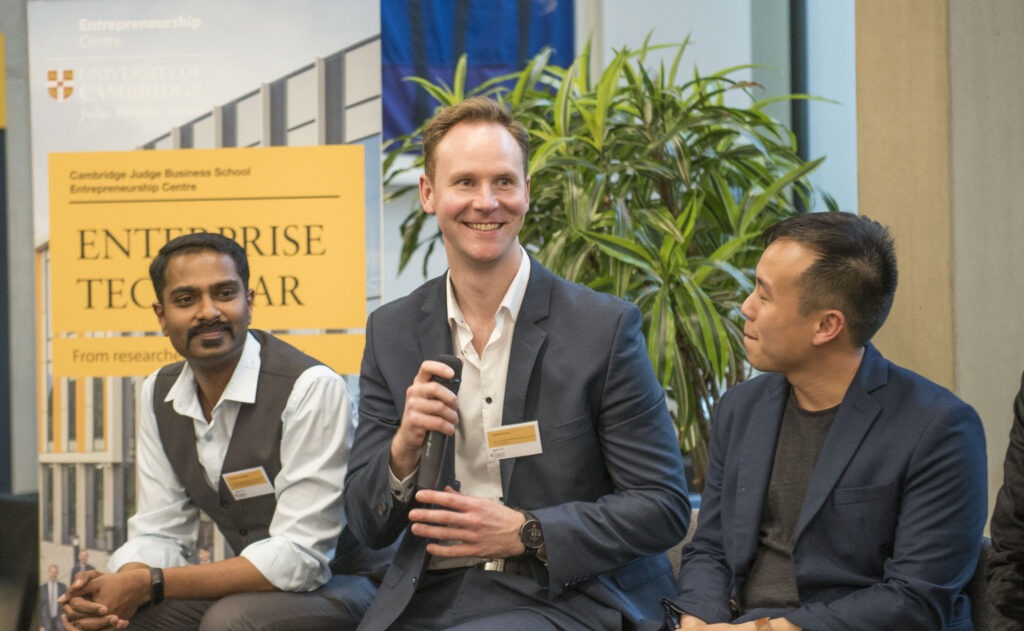By Dr Sebastian Larsen


After completing the EnterpriseTECH and EnterpriseTECH STAR programmes at Cambridge Judge Business School’s Entrepreneurship Centre, Dr Sebastian Larsen (pictured centre) is transforming his PhD research into a new commercial venture, Nexus Additive. He talks about his experience and what he learnt.
I’m a recent PhD graduate and now postdoc at Imperial College, specialising in the intersection of artificial intelligence (AI) and metal 3D printing. This year, I’ve had the privilege of exploring the commercial potential of my research through EnterpriseTECH STAR as one of 16 fellow researchers that were selected.
I’m keen to share my journey and how this opportunity is helping me transition from academia while progressing a newly co-founded company, Nexus Additive Ltd.
Let me give you a bit of background on the space we’re working in, then I’ll take you through how this entrepreneurship education has helped me reach the next stage — being selected for the Imperial-led AI SuperConnector Accelerator.
The challenge of metal 3D printing
Metal 3D printing is a cutting-edge technology with huge potential across multiple industries. Aerospace companies, for example, use it for “light-weighting” — producing lighter parts that reduce fuel consumption. However, despite its many advantages, one major drawback is the high cost of ensuring quality. Depending on the application, quality control costs can account for anywhere from 30% to 90% of the total cost per part. The reason for this is the instability of the metal 3D printing process, which leads to defects and inconsistencies that are difficult to detect. My PhD research set out to tackle this challenge. Specifically, I developed an AI-powered machine learning model that can automate the analysis of the vast amounts of data generated during the 3D printing process. This model can predict defects in real time and with remarkable accuracy, identifying flaws as small as 100 microns in diameter — about the width of a human hair. By comparison, current inspection methods like X-ray Computer Tomography only detect defects after the printing process has finished, meaning companies are investing more time and resources into detecting problems after the fact, rather than preventing them upfront.
The inspiration behind the research
The promise of 3D printing is immense, but so are its challenges. My research addresses a critical issue: ensuring consistent, high-quality components. Inspired by this, I pursued a PhD to develop AI-powered thermal imaging tools at Imperial College’s world-class additive manufacturing lab. My time in industry revealed the real-world importance of these tools in solving key quality challenges. One major hurdle is handling the massive datasets generated by metal 3D printing, which can exceed a terabyte per part. To scale this technology for industry, we need to create accessible tools that don’t require PhD-level expertise to interpret.
Unlocking new opportunities with 3D printing farms
Looking ahead, I’m particularly excited about the potential for 3D printing farms — large-scale operations where parts can be printed on demand. Think of it as a warehouse with shelves that grow the parts you need, whenever you need them. I believe the AI technology I’ve developed can play a critical role in making this vision a reality. By reducing the cost and complexity of quality control, we can make digital warehousing a viable option for industries like aerospace, automotive, and beyond. This, in turn, could revolutionize supply chains by reducing the need for large inventories and enabling more flexible, just-in-time production.
Entrepreneurship education and preparation
EnterpriseTECH STAR helps researchers like me transition from academia to entrepreneurship, building a first narrative for our business ideas while they’re still deeply rooted in scientific language. On EnterpriseTECH, our team worked on a pitch and commercial feasibility report. My role involved primary market research, which meant contacting hundreds of companies to set up interviews. It was tough, with many rejections, but the successful interviews were incredibly rewarding.
By the end of the programme, conversations with previous STAR alumni inspired me to apply for STAR myself. I wanted to take my own research to the next level, improve how I communicated its commercial value and scope out its potential as a future business.
EnterpriseTECH STAR was hard work but also a lot of fun. Every meeting was unique, and without giving too much away, the experience was both world-class and challenging. Beyond working on our business ideas, there was a big focus on personal development, which really pushed us out of our comfort zones. One of the biggest takeaways for me was just how crucial a strong team is to any start-up. During my PhD, I spent a lot of time deep in research — really in the weeds, so to speak. But as an entrepreneur, you’ve got to zoom out and see the bigger picture. EnterpriseTECH STAR helped me do just that, especially when it came to understanding the importance of co-founders. Now, I’m lucky to work with an incredibly capable team, and that’s given me the confidence to take things to the next level.
“The viability of commercialising Sebastian’s PhD research at Imperial was a topic we often discussed, but other priorities would limit meaningful progress. When the opportunity arose for him to join the Cambridge EnterpriseTECH STAR, it was clear this is what we needed to get serious. The programme’s blending of entrepreneurship with deep tech expertise has allowed us to fully crystallise our vision for AI-driven 3D printing solutions. It gave us the confidence and skills to transition from academic research to creating impactful, market-ready innovations, and, with Imperial’s backing, has been a game-changer getting Nexus Additive off the ground.”
Dr Paul Hooper, Senior Lecturer, Imperial College London.
I’m now part of the AI SuperConnector, a new accelerator for early-career researchers with entrepreneurial ambitions. What really drew me in was the focus on developing solid and ethical AI solutions that drive both economic and societal progress. Thanks to everything I gained from STAR, I feel completely ready for this next stage.
I hope my experience inspires those of you who are working on research but are unsure about taking the commercial path. I can’t recommend EnterpriseTECH STAR enough — it’s truly been life-changing. If you’re thinking about starting an entrepreneurial journey, now’s the time to go for it. Sign up and see where it takes you! Just make sure you complete EnterpriseTECH first — good luck!
Sebastian received a Henry Royce Institute Scholarship to cover his EnterpriseTECH programme fees and
was funded by his CDT at Imperial to attend EnterpriseTECH STAR.




Leave a Reply